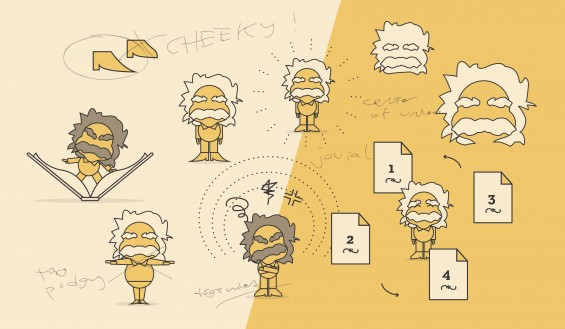
40 brilliant idioms that can’t be translated literally
It’s a piece of cake. You can’t put lipstick on a pig. Why add fuel to the fire? Idioms are those phrases that mean more than the sum of their words. TED Translators are often challenged to translate English idioms into other languages. Which made us wonder: what are their favorite idioms in other languages? Below, TED Translators share their favorite idioms and how they would translate literally. The results are laugh-out-loud funny.
From German translator Johanna Pichler:
The idiom: Tomaten auf den Augen haben.
Literal translation: “You have tomatoes on your eyes.”
What it means: “You are not seeing what everyone else can see. It refers to real objects, though — not abstract meanings.”
The idiom: Ich verstehe nur Bahnhof.
Literal translation: “I only understand the train station.”
What it means: “I don’t understand a thing about what that person is saying.’”
The idiom: Die Katze im Sack kaufen.
Literal translation: “To buy a cat in a sack.”
What it means: That a buyer purchased something without inspecting it first.
Other languages this idiom exists in: We hear from translators that this is an idiom in Swedish, Polish, Latvian and Norwegian. In English, the phrase is “buying a pig in poke,” but English speakers do also “let the cat out of the bag,” which means to reveal something that’s supposed to be secret.
From Swedish translator Matti Jääro:
The idiom: Det är ingen ko på isen
Literal translation: “There’s no cow on the ice.”
What it means: “There’s no need to worry. We also use ‘Det är ingen fara på taket,’ or ‘There’s no danger on the roof,’ to mean the same thing.”
The idiom: Att glida in på en räkmacka
Literal translation: “To slide in on a shrimp sandwich.”
What it means: “It refers to somebody who didn’t have to work to get where they are.”
The idiom: Det föll mellan stolarna
Literal translation: “It fell between chairs.”
What it means: “It’s an excuse you use when two people were supposed to do it, but nobody did. It has evolved into the slightly ironic phrase, ‘It fell between the chair,’ which you use when you want to say, ‘Yeah, I know I was supposed to do it but I forgot.’”
From Thai translator Kelwalin Dhanasarnsombut:
The idiom: เอาหูไปนา เอาตาไปไร่
Literal translation: “Take ears to the field, take eyes to the farm.”
What it means: “It means ‘don’t pay any attention.’ Almost like ‘don’t bring your eyes and ears with you.’ If that were possible.”
The idiom: ไก่เห็นตีนงู งูเห็นนมไก่
Literal translation: “The hen sees the snake’s feet and the snake sees the hen’s boobs.”
What it means: “It means two people know each other’s secrets.”
The idiom: ชาติหน้าตอนบ่าย ๆ
Literal translation: “One afternoon in your next reincarnation.”
What it means: “It’s never gonna happen.”
Other languages this idiom exists in: A phrase that means a similar thing in English: “When pigs fly.” In French, the same idea is conveyed by the phrase, “when hens have teeth (quand les poules auront des dents).” In Russian, it’s the intriguing phrase, “When a lobster whistles on top of a mountain (Когда рак на горе свистнет).” And in Dutch, it’s “When the cows are dancing on the ice (Als de koeien op het ijs dansen).”
From Latvian translators Ilze Garda and Kristaps Kadiķis:
The idiom: Pūst pīlītes.
Literal translation: “To blow little ducks.”
What it means: “It means to talk nonsense or to lie.”
Other language connections: In Croatian, when someone is obviously lying to someone, you say that they are “throwing cream into their eyes (bacati kajmak u oči).”
The idiom: Ej bekot.
Literal translation: “‘Go pick mushrooms,’ or, more specifically, ‘Go pick boletes!’”
What it means: “Go away and/or leave me alone.”
From French translator Patrick Brault:
The idiom: Avaler des couleuvres.
Literal translation: “To swallow grass snakes.”
What it means: “It means being so insulted that you’re not able to reply.”
The idiom: Sauter du coq à l’âne.
Literal translation: “To jump from the cock to the donkey.”
What it means: “It means to keep changing topics without logic in a conversation.”
The idiom: Se regarder en chiens de faïence.
Literal translation: “To look at each other like earthenware dogs.”
What it means: “Basically, to look at each other coldly, with distrust.”
The idiom: Les carottes sont cuites!
Literal translation: “The carrots are cooked!”
What it means: “The situation can’t be changed.”
Other language connections: It’s bit like the phrase, “It’s no use crying over spilt milk,” in English.
From Russian translator Aliaksandr Autayeu:
The idiom: Галопом по Европам
Literal translation: “Galloping across Europe.”
What it means: “To do something hastily, haphazardly.”
The idiom: На воре и шапка горит
Literal translation: “The thief has a burning hat.”
What it means: “He has an uneasy conscience that betrays itself.”
The idiom: Хоть кол на голове теши
Literal translation: “You can sharpen with an ax on top of this head.”
What it means: “He’s a very stubborn person.”
The idiom: брать/взять себя в руки
Literal translation: “To take oneself in one’s hands.”
What it means: “It means ‘to pull yourself together.’”
Other languages this idiom exists in: Translators tell us that there is a German version of this idiom too: “Sich zusammenreißen,” which translates literally as “to tear oneself together.” And in Polish, the same idea is expressed by the phrase, “we take ourselves into our fist (wziąć się w garść).”
From Portuguese translators Gustavo Rocha and Leonardo Silva:
The idiom: Quem não se comunica se trumbica
Literal translation: “He who doesn’t communicate, gets his fingers burnt.”
What it means: “He who doesn’t communicate gets into trouble.”’
The idiom: Quem não tem cão caça com gato
Literal translation: “He who doesn’t have a dog hunts with a cat.”
What it means: “You make the most of what you’ve got.” Basically, you do what you need to do, with what the resources you have.
The idiom: Empurrar com a barriga
Literal translation: “To push something with your belly.”
What it means: “To keep postponing an important chore.”
The idiom: Pagar o pato
Literal translation: “Pay the duck.”
What it means: “To take the blame for something you did not do.”
From Polish translator Kinga Skorupska:
The idiom: Słoń nastąpił ci na ucho?
Literal translation: “Did an elephant stomp on your ear?”
What it means: “You have no ear for music.”
Other languages this idiom exists in: Our translators tell us that in Croatian, there’s also a connection made between elephants and musical ability in the phrase, “You sing like an elephant farted in your ear (Pjevaš kao da ti je slon prdnuo u uho.).” But in the Latvian version, it’s a bear who stomps on your ear.
The idiom: Bułka z masłem.
Literal translation: “It’s a roll with butter.”
What it means: “It’s really easy.”
The idiom: Z choinki się urwałaś?
Literal translation: “Did you fall from a Christmas tree?”
What it means: “You are not well informed, and it shows.”
From Japanese translators Yasushi Aoki and Emi Kamiya:
The idiom: 猫をかぶる
Literal translation: “To wear a cat on one’s head.”
What it means: “You’re hiding your claws and pretending to be a nice, harmless person.”
The idiom: 猫の手も借りたい
Literal translation: “Willing to borrow a cat’s paws.”*
What it means: “You’re so busy that you’re willing to take help from anyone.”
The idiom: 猫の額
Literal translation: “Cat’s forehead.”
What it means: “A tiny space. Often, you use it when you’re speaking humbly about land that you own.”
The idiom: 猫舌
Literal translation: “Cat tongue.”
What it means: “Needing to wait until hot food cools to eat it.”
*Yes, Japanese has quite a few cat idioms.
From Kazakh translator Askhat Yerkimbay:
The idiom: Сенің арқаңда күн көріп жүрмін
Literal translation: “I see the sun on your back.”
What it means: “Thank you for being you. I am alive because of your help.”
From Croatian translator Ivan Stamenkovic:
The idiom: Doće maca na vratanca
Literal translation: “The pussy cat will come to the tiny door.”
What it means: “Essentially, ‘What goes around comes around.’”
The idiom: Da vidimo čija majka crnu vunu prede
Literal translation: “We see whose mother is spinning black wool.”
What it means: “It’s like being the black sheep in the family.”
The idiom: Muda Labudova
Literal translation: “Balls of a swan.”
What it means: “It means something that’s impossible.”
The idiom: Mi o vuku
Literal translation: “To talk about the wolf.”
What it means: “It’s similar to ‘speak of the devil.’”
Other language connections: In Polish, “O wilku mowa” is the equivalent.
From Tamil translator Tharique Azeez:
The idiom: தலை முழுகுதல் (Thalai Muzhuguthal)
Literal translation: “To take a dip or pour water over someone’s head.”
What it means: “To cut off a relationship.”
The idiom: தண்ணீர் காட்டுதல் (Thanneer Kaattuthal)
Literal translation: “Showing water to someone.”
What it means: “It means to be someone’s nemesis.”
From Dutch translator Valerie Boor:
The idiom: Iets met de Franse slag doen
Literal translation: “Doing something with the French whiplash.”
What it means: “This apparently comes from riding terminology. It means doing something hastily.”
The idiom: Iets voor een appel en een ei kopen
Literal translation: “Buying something for an apple and an egg.”
What it means: “It means you bought it very cheaply.”
Other language connections: Spanish translator Camille Martínez points out out that when something is expensive in English, you pay two body parts for it (“it cost me an arm and a leg”), whereas in Spanish you only pay one — either a kidney (“me costó un riñón”) or an eye (“me costó un ojo de la cara”).
From Korean translator Jeong Kinser:
The idiom: 똥 묻은 개가 겨 묻은 개 나무란다
Literal translation: “A dog with feces scolds a dog with husks of grain.”
What it means: “It’s a bit like, ‘People who live in glass houses shouldn’t throw stones.’”
The idiom: 오십보 백보
Literal translation: “50 steps are similar to 100 steps.”
What it means: “I think of it as, ‘Six of one, half a dozen of the other.’”
This article has been adapted for TED-Ed from this great TED Blog post.
To learn something new every week, sign up for the weekly TED-Ed Newsletter here >>





What about Spanish?!
Read the Portuguese idioms. We say “pagar el pato” in Spain, too.
Great and quite funny post. There is even the polish idiom, so in my mothertongue
Avaler des couleuvres doesn’t mean to be insulted to a point you can’t reply. It means being forced to agree to an opinion or action (for instance in order to keep your job, or to save a relationship) in a situation where you feel humiliated to do so. It can also mean being aware of being lied to and not being in a position to respond.
To buy a cat in a sack exists in French too : acheter chat en poche which means buying without checking what you are being sold. But this expression is rarely used today.
To take oneself in one’s hand translates exactly the same in French : se prendre en main.
In Norwegian we swallow camels = “Å svelge en kamel”. This means the same as you describe here, when I first read the “swallow grass snakes” description I thought it was close, but not the same. But the description you add is more accurate for the camel-swallowing idiom.
We also buy cats in sacks in Norway. And if we think something does not feel right, as if you are beeing lied to or sensing that someone is purposely misleading you, you can say that you are “sensing owels in the moss” (aner ugler i mosen).
If you think someone is a bad guy /criminal you question if he has “pure flour in his bag” (rent mel i posen) – meaning that he has not dilutet his flour with something else.
Also we have “buying something for a lolipop and nothing” the same as the dutch “egg and apple” (kjøpe noe for en slikk og ingenting), buting something really cheap.
In Portuguese we could say: “engolir sapo” same meaning.
The Instituto Cervantes has a huge multilingual idioms dictionary on their website
Students of 7 Junior High Schools in Europe created an eTwinning project and blog on Superfoods called EUROPE’S ABC OF SUPERFOODS.They included e- books of proverbs and idioms in our mother tongues translated in English.Take a look at these: eaubcsf.blogspot.gr/ 2016/02/superfoods-in-proverbs.html
and eabcsf.blogspot.gr/2016/02/this-is-our-common-collection-of-idioms.html
Amusing post.
In my mother tongue Burushaski, “Siley Bash” literally means “bridge of water”.
We have a lot of idioms in Spanish (Mexico)…
The Idiom: “Echarle mucha crema a los tacos”
Literal Translation: “throw a lot of cream to tacos”
What it mean: “Exaggerate or boast about something”
In Russia we buy a cat in the sack too))
The Portuguese idiom “Quem não tem cão caça com gato”, is wrong, and most people use it the wrong way. The right way is “Quem não tem cão caça COMO gato” which literaly translates as “He who doesn’t have a dog hunts like a cat”, but the meaning is basicaly the same.
Very interesting post!! These translations could be useful for the beginner translator, who wants to learn the process of translation in a fun way.
Acctually, those idioms which Ivan Stamenkovic has sent you are serbian.
In the Philippines, we say “Aanhin pa ang damo kung patay na ang kabayo?”
Literal Translation: What would you do with the grass if the horse is already dead?”
What it Means: Strike while the iron is hot. Seize the opportunity. Carpe diem. (Or something like that.)
In Geailge (Irish): Tá sé ar mhuin na mhuice
Translation: He is on the pig’s back
Meaning: He is enjoying a stroke of good luck or fortune
What about Spanish sayings?
Franse slag, is a quick battle… French used to hastily attack without much preparation.